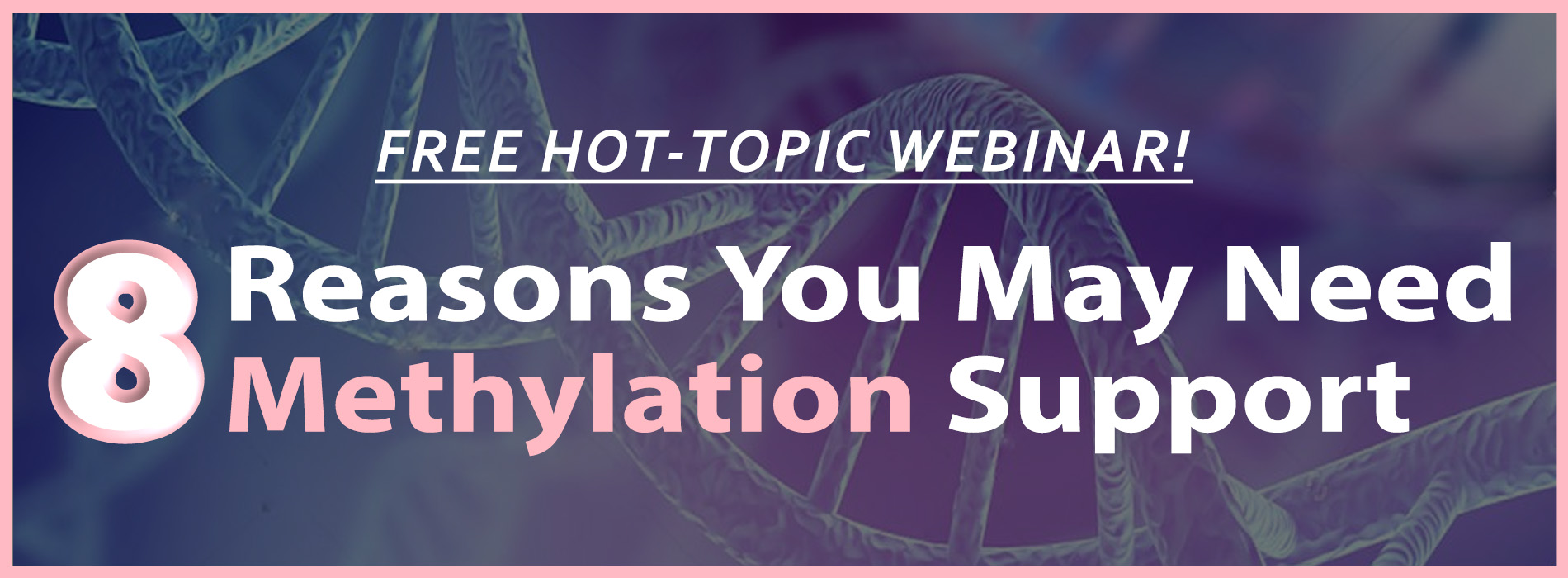Proper methylation is essential for life. Methylation is involved in many important body functions like gene expression, fetal development, detoxification of heavy metals and so much more.
Technically, methylation is a simple chemical process that involves adding a ‘methyl group’ onto other chemical compounds which then allows the body to do most of its processes. Only one problem though…
The more we learn about methylation, the more we seem to get confused about it!
Methylation isn’t as simple as MTHFR and folate anymore.

Turns out its much more complex as we factor in the many biochemical pathways that are affected by or that influence methylation, not to mention the myriad of genetic, nutritional, environmental and other influences that effect it.
Because it is so essential, and because of our busy lifestyles and nutrient-depleted foods, it could be that many of us need more support when it comes to methylation. But how do you know?
Clinicians are bombarded with an array of testing options, but not all clients can afford testing, and in some states testing options are limited. Genomic testing can tell you a lot about risk but not whether there’s an expression of that risk.
Therefore, it’s very important to conduct a thorough assessment in order to start the process of offering personalized recommendations for safe and effective support.
Begin with the Signs of Possible Methylation Problems
In this hot-top webinar, Susan Allen RDN, CCN, FMNS addresses the top 8 signs that may identify the need for further investigation into your client’s needs for methylation support.
Your Presenter:

Susan Allen-Evenson, RDN, CCN, FMNS
As a recognized Functional Nutrition expert, Susan Allen-Evenson provides a unique and very successful approach to personalized health and wellness as she incorporates an overall focus on the mind-body-spirit connection in her work as a speaker, mentor, author and nutrition consultant. Susan earned her nutrition degree in Medical Dietetics from the University of Illinois and became a Registered Dietitian (RD) in 1991. She subsequently completed post-graduate level training to become a Certified Clinical Nutritionist (CCN), which designates her specialty in the nutritional aspects of Functional Medicine.
Ms. Allen-Evenson has worked in many settings in addition to her own private practice. She was involved in one of the first free-standing nationally-based Integrative Medicine clinics, American Whole Health. She also consulted for the startup of The Center for Integrative Medicine affiliated with prestigious Northwestern Memorial Hospital in Chicago.
Ms. Allen-Evenson has held board appointments with The International and American Association of Clinical Nutritionists, the Academy of Nutrition and Dietetics’ sub-specialty group: Dietitians in Integrative and Functional Medicine (DIFM), on the Nutrition Board of the Institute for Functional Medicine (IFM) and on the Scientific Advisory Board of Integrative Therapeutics, Inc., one of the largest natural medicine manufacturers in the United States
With her passion for educating, Ms. Allen-Evenson lectures nationwide and has been a consultant to the nutraceutical industry. In her almost three decades of practice, Susan has recognized the growing divide between traditional dietetics training and the emerging trends in Integrative and Functional Medicine. Understanding many health care providers, especially dietitians, are missing a key opportunity, she launched a unique national mentoring initiative, Next Level Functional Nutrition, to provide training to registered dietitians and other healthcare professionals wanting to learn this specialty.
Considered an authority, she has appeared on numerous radio and television programs, has been quoted extensively in the press, and is also a published author. She was Chief Nutritional Consultant for the Reader’s Digest book; Food Cures: Breakthrough Nutritional Prescriptions for Everything from Colds to Cancer and she was a contributing author to the first college textbook of its kind, Integrating Therapeutic and Complementary Nutrition, CRC Press 2007. Ms. Allen-Evenson has also authored a chapter in AAPI’s Nutrition Guide To Optimal Health: Using Principles of Functional Medicine and Nutritional Genomics.


